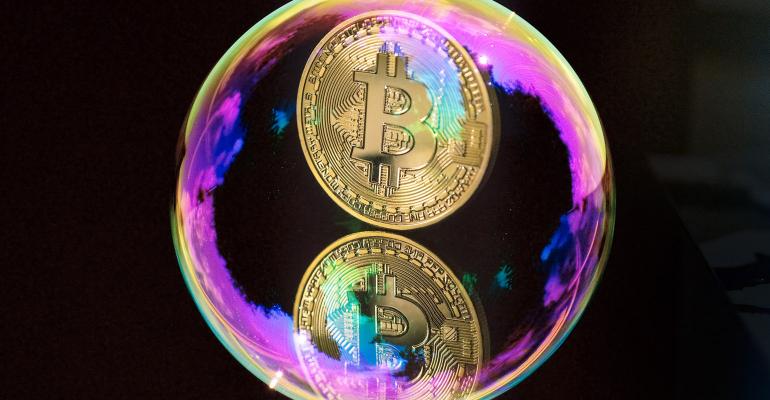(Bloomberg Opinion) -- The entire business model of cryptocurrencies is at risk of falling apart, and Wall Street firms couldn’t be any happier.
Now that the US Securities and Exchange Commission has decided to regulate a range of widely traded digital coins as securities, and sued two of their largest trading venues for peddling them without first registering the tokens with the authority, there is a good chance that blockchain leadership may finally pass over to regulated banks.
From the perspective of financial stability, a change of guard will be welcome. Crypto exchanges burst through a gap left unplugged by Satoshi Nakamoto. In his 2008 white paper, the pseudonymous founder of the Bitcoin network didn’t suggest an obvious way for people to swap their dollars and euros for decentralized currencies. Digital-asset bourses, which allowed people to do that and more, morphed into shadow banks, offering traders leverage of up to 125 times on their investment, while being sparsely regulated all along.
If crises of liquidity and solvency in the crypto industry haven’t yet threatened mainstream finance, that’s only because of their limited linkages. It’s only a matter of time, however, before the two get more closely intertwined. Some of that commingling may well happen outside the US. Even as the SEC was tightening the screws, a Hong Kong lawmaker took to Twitter to invite virtual-asset trading operators to come to the city, which pushed ahead with a new regulatory regime on June 1. Hong Kong’s crypto-hub ambitions have Beijing’s quiet backing.
Ultimately, though, the thinking in Washington will prevail, as no financial center of repute will want to risk its stability for the sake of additional business. And the regulatory mood in the US is pretty clear. While Ripple Labs Inc. and its top executives were accused by the SEC in late 2020 of selling XRP tokens without registering them, it was Sam Bankman-Fried’s FTX, the most spectacular of last year’s crypto debacles, that made a major crackdown inevitable. It arrived this month with the SEC suing Binance Holdings Ltd. and Coinbase Global Inc.
Following the lawsuits, banks are withdrawing support from Binance’s US site, whose customers will no longer be able to bring in or take out dollars. Binance.US, which has described the SEC’s civil action as unjustified and vowed to fight it, will transition to a crypto-only exchange.
Meanwhile, Coinbase, which has denied the SEC’s allegations that it has acted as an exchange, broker-dealer and clearinghouse — all without registering with the agency for any of those roles — is under pressure from state regulators who’re demanding that the biggest US crypto exchange halt its staking program. Staking is a service that channels capital for decentralized finance, or DeFi, projects, by giving investors a passive income for locking their crypto assets via self-executing software known as smart contracts.
The overall message from authorities is this: Investors should be gradually pushed out of the unregulated corners of the cryptocurrency world without depriving them of the efficiencies of decentralized ledgers, smart contracts or some other vaunted innovation. Let the average retail customer of a bank put a portion of her deposits on the blockchain. As long as a well-regulated depository institution channels those savings, there will be no reason to worry about additional systemic risk. Returns for investors will come not from excessive leverage but fractionalization. Investing opportunities typically reserved for wealthy private-banking clients will become available to mass-market customers.
This fits well with the Bank for International Settlements’ vision of a unified ledger. Central-bank digital currencies will sit in one part of the ledger, while bank-deposit coins will be housed in another. Behind another partition will lie all the real-world assets one could buy — stocks, bonds, apartments, toll roads — in tokenized forms. The whole thing will be analogous to a smartphone, where all applications use the same programming environment. Just as a picture taken by the phone’s camera has no problem being read by a social-media app, money would move seamlessly between compartments of the unified ledger, and go into all kinds of utilities dreamed up by the private sector.
Mainstream finance, supervised by national monetary authorities, has long viewed the crypto industry as fundamentally unstable and socially useless. Unregulated exchanges, stablecoins resembling money-market funds and speculative altcoins (stuff other than Bitcoin and Ether) have undoubtedly pioneered many blockchain applications. Going forward, licensed financial institutions like JPMorgan Chase & Co. may as well take control of the technology. After all, tokenized customer deposits will offer all the functionalities of programmable money. So why not promote them in smart contracts, as an alternative to stablecoins like Circle Internet Financial Ltd.’s USDC?
Authorities can at times lose control of depositary institutions, as we saw with the multiple US bank failures this year. Still, the risks are largely known, which isn’t the case with digital assets. Now that the US regulators are determined to check the unbridled growth of crypto, Wall Street can move in with tokenized versions of its own traditional products — starting with the humble bank deposit.
More from Bloomberg Opinion:
- Maybe Coinbase Should Never Have Gone Public: Lionel Laurent
- Matt Levine’s Money Stuff: When Is a Token Not a Security?
- Could Coinbase and Binance Ever Be Legal Exchanges?: Editorial
Want more Bloomberg Opinion? OPIN <GO>. Or you can subscribe to our daily newsletter.
To contact the author of this story:
Andy Mukherjee at [email protected]





